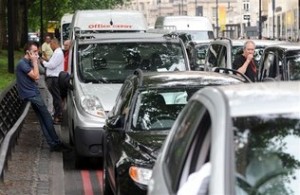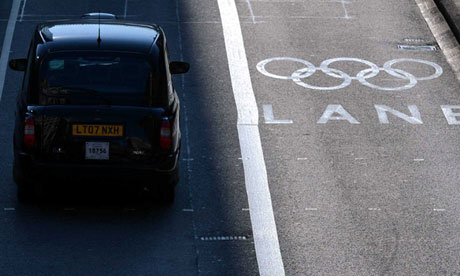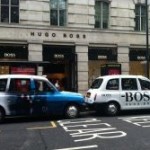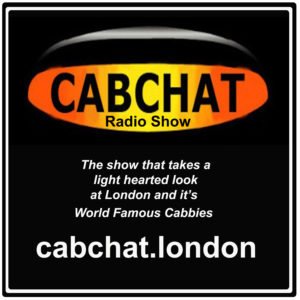by News Desk | Jul 28, 2012 | London News
BBC Two is looking for a Taxi Driver to take part in the latest programme of the award-winning current affairs documentary series: Toughest place to be… a Taxi Driver!
The Toughest Place to be… series takes British workers to do their jobs in some of the most challenging places in the world. Previous programmes have seen a fisherman cast off to Sierra Leone, a bus driver swapping his double-decker for a Jeepney in the Philippines and a paramedic dealing with the aftermath of gang fighting in Guatemala City.
For the latest series the team are looking for Taxi Drivers who are up for a challenge and would like to test themselves on the roads of a far-flung country. This is an exciting opportunity to experience a different culture and see what life is like for a cab driver on the other side of the world.
Previous participants in the series, such as binman Wilbur (pictured), have talked about how the experience has changed their lives. They have forged strong friendships with their host family and have gained a unique connection with a foreign country.
Josh, a London bus driver who took part in the second series of the show, said he felt like he found a brother when Filipino host Rogelio let him in to his life and entrusted him with driving his precious Jeepney.
- For the latest series one adventurous cabbie will spend 10 days living and working in another country in September 2012. It’s a once in a lifetime chance to explore a new culture, it looks set to be a real challenge but it will no doubt be a rewarding and memorable experience.
If you are a black cab driver interested in finding out more about this challenge then get in contact with Rosie on 020 3614 0390. All calls are confidential and you will be under no obligation to take part.
For more info:
email: rosie.saunders@bbc.co.uk
or call: 020 3614 0390 or 07583 054 515
or have a look at past programmes on the BBC website: http://www.bbc.co.uk/programmes/b00z08wd
by News Desk | Jul 28, 2012 | London News
LONDON — London taxi drivers mounted a third protest on Friday over their exclusion from road lanes dedicated to Olympic traffic, with just hours to go before the games’ opening ceremony.
Traffic snarled in central London once the protest got under way at London’s Hyde Park corner at 2 p.m. (1300 GMT; 9 a.m. EDT). The demonstration had been slated for 5 p.m., but cabbies moved up the time after police put restrictions on their demonstration.
 The Olympics opening ceremony is expected to start at 9 p.m. London time.
The Olympics opening ceremony is expected to start at 9 p.m. London time.
The drivers of London’s iconic black cabs are miffed that they are not allowed into the “Games Lanes” reserved for Olympic athletes, officials and VIPs. Cabbies have held two other demonstrations on previous days, including one that jammed traffic at Parliament square.
by News Desk | Jul 28, 2012 | London News
 Taxi drivers say they should be able to use Olympic lanes reserved for athletes and officials.
Taxi drivers say they should be able to use Olympic lanes reserved for athletes and officials.
London taxi drivers have brought forward a protest over a ban on using Olympic traffic lanes after police imposed restrictions on the demonstration.
The drivers were due to start their protest at Hyde Park Corner at 5pm, a few hours before the official opening of the Games, but it will now be held at 2pm.
The cabbies have already held two demonstrations, including one which brought traffic to a halt outside the Houses of Parliament.
They argue that they should be able to use the lanes, which are available only to Olympic officials and athletes.
Scotland Yard said it had imposed conditions on the demonstration under section 12 of the Public Order Act 1986.
“The Metropolitan police took the decision based on concerns that, if the protest were to go ahead in the time and location specified by the group, it would cause serious disruption to the life of the community,” said a statement.
“The conditions imposed state that the protest must not start after 1600 on 27 July nor recommence until 0400 on 28 July on any part of the Olympic route network. During the time period specified all participants must remain south of the river Thames, must remain in their vehicles and remain moving unless they become stationary by circumstances outside their control.
“Our position on protest is clear – people do have a right to demonstrate, which is an important part of our democracy; however, that right must be balanced against the rights of others.
“We will facilitate protest and take a proportionate approach at all times.”
by News Desk | Jul 28, 2012 | London News, World News

London — It’s midnight in this city that never sleeps, although it occasionally nods off after a big meal. I hop into a taxi.
Just off work and what else am I going to do? Go back to the hotel and watch a David Niven film on the telly?
It’s the perfect time to indulge in one of London’s true treats, a poor-man’s limo ride.
“Give me a one-hour tour of your city,” I say. “Show me anything you think is interesting.”
And we’re off.
I profiled in selecting a cab, preferring a longtime driver who might have a story or two. I get Brian Connelly, 68, a Jewish-Irish genuine cockney whose spent 43 years behind the wheel. Show me a cockney cab driver who isn’t affable, and I’ll show you fish without chips.
Also, it had to be a “black” cab. That refers not to color, but to the body style, the iconic clunky-looking London chugger. Anything else and you’re likely to get a driver who doesn’t have the Knowledge – the London taxi equivalent of a college degree in cab driving.
A lot of our tour will be down memory lane. Connelly isn’t bitter about modern changes, but is wistful for the good old days. Many of the neighborhoods he shows me are populated by ghosts.
“This is Fleet Street,” Connelly says. “All the great newspapers used to have offices here. Whenever you picked up a journalist, they was always, always, always drunk. Journalists then had a lot of power, and they were under a lot of pressure, hence all the drinking.”
I ask Brian if he’s disappointed to have a sober news guy in his cab. He’s too nice to say he preferred those raging-drunk, ink-stained power-brokers of yore.
The streets are nearly deserted, to be re-clogged come morning. Many lanes on main London streets are marked for Olympic vehicles only; everyone else gets hopelessly bumper-to-bumpered. London cab drivers are irate that their taxis are not accorded Olympian status.
“There was a protest Monday,” Connelly says. “One cabbie jumped off the Tower Bridge.”
Now we’re in Cheapside, East London, and Connelly pulls up to an ancient church.
“That’s St. Mary-le-Bow. It was destroyed in the Great Fire of 1666, rebuilt byChristopher Wren. You’re a true cockney if you’re born within the sound of the Bow Bells.”
True cockneys: Charlie Chaplin, Sid Vicious, Len Goodman. Also the Kray twins, Ronnie and Reggie, ruthless ’50s-’60s mobsters who were tight with Sinatra and Judy Garland, and were folk heroes to the locals. Now the Bow Bells peal for immigrants from Asia and other lands. The old true cockneys long ago moved to the suburbs and beyond.
Connelly says that in his youth, the ’60s, he was a “mod,” a dedicated follower of fashion. Impressed the birds with his exotic Levis, unavailable in England but bought off U.S. ship crewmen.
Connelly decided in his early 20s to become a cab driver. A serious life commitment but a way to escape the squalor.
“Big hours, big money,” Connelly says. “Sky’s the limit.”
He spent three years as an unpaid Knowledge Boy, riding a moped and learning London in a circle within a six-mile radius of mid-city.
The Knowledge Boy (or Girl) must make “an appearance” – take an oral test of his grasp of London. Fail the test and he must try again a month later. Most fall short numerous times. It took Connelly 19 months to pass, to earn his badge and official certificate proving he possesses the Knowledge.
A proper London cabbie has a high-def GPS embedded in his cerebral hard drive. Connelly could probably drive his shift blindfolded.
He is a “musher,” an owner-driver. Some drivers rent a cab for 220 pounds a week. Connelly bought his for 37,000 pounds. He must present it every year for rigorous inspection. If it’s not impeccably clean and mechanically perfect, Connelly is out of business. When a cab is 15 years old, it is removed from service. Connelly just sold his retired Fairway, in near-mint condition, for 700 pounds.
The new models are superior in almost every way, but “these have not got the style.”
Now we’re in Spitalfields, another scruffy East End neighborhood, Jack the Ripper’s old stabbing grounds. We cruise past a pub that was named the Ten Bells when one of Jack’s victims had her final drink there. Now yuppies sip and mingle.
One alley-like street is teeming with Bangladeshi men in Muslim caps. We pass Brian’s favorite bagel shop. He pronounces it “BY-gull.”
Connelly has great reverence for the 18th century apartments and shops, in their various states of decay and preservation.
“These buildings are from the time of Queen Victoria, of Charles Dickens!” he says.
London back then, Connelly observes, was the world’s most civilized and beautiful city, and the most squalid slum on Earth, the two opposites separated by a couple kilometers.
A plastic Elvis swivels on Connelly’s dashboard.
“Me and my wife are in the rock-n-roll scene,” he says. “Every weekend we go jiving. Go to different clubs and dance to Buddy Holly records, Chuck Berry, Elvis.”
Jiving helps keep Connelly in business. Every cabbie past 65, like his car, must have an extensive annual checkup. If your blood pressure or cholesterol level exceeds strict standards, turn in your badge, mate, you just retired.
Four nights a week Connelly hits a nearby track to run 2 to 3 miles.
Back in the day, he says, cab drivers were a fraternity. They played golf together every week, ate meals together during shifts.
“We had fabulous camaraderie. Now all that is gone. Now you see guys go to McDonald’s, get a hamburger, sit in their car and eat it.” He shakes his head.
Connelly has two sons, both born within the sound of the Bow Bells. Danny is a cabbie, Mark is a professor of World War I history at Kent University.
There’s my hotel. The ghosts of Fleet Street call me to a flagon of grog. I now have a one-hour degree in cabology. I have knowledge of The Knowledge. My tuition: 65 quid.
Brian says cheers like we’re old mates, and he and Elvis drive away into the night.
San Francisco Chronicle http://sfgate.com
by News Desk | Jul 25, 2012 | London News
 Hugo Boss has launched an advertising campaign with London Taxi Advertising, which will see cabs wrapped in full livery for 12 months.
Hugo Boss has launched an advertising campaign with London Taxi Advertising, which will see cabs wrapped in full livery for 12 months.
Two designs will run for the launch, one full livery branded cab with the Hugo Boss logo raising awareness, and another blue cab showcasing the Autumn/Winter collection, which will be re-wrapped later in the year to promote the 2013 Spring/Summer collection.
London Taxi Advertising was appointed by Media Agency Group, and will supply and wrap the cabs.
John Kehoe, director of the Media Agency Group, said: “We are delighted to promote an international fashion brand on London taxis, showcasing the attractive visual image of the Hugo Boss Campaign. We are one the largest independent buyers of Outdoor Advertising in the UK and have trialled a number of leading taxi companies in the past, but going forward we will continue to work with London Taxi Advertising. The team demonstrated sound understanding of the market during their pitch and offered the greatest ROI for our client. London Taxi Advertising has executed the campaign to the highest standards from the printing and fitting, to providing the best brand ambassadors driving the taxis that London has to offer.”











Recent Comments